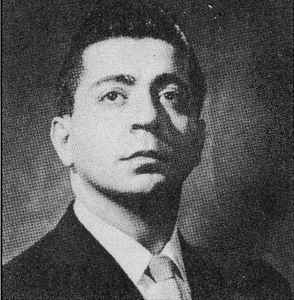Philip Maero was born in New York City in 1924. His father Fernando Maero was a singing teacher. Tenor Fernando Maero and his
brother, baritone Joseph Maero were brought to America by Oscar Hammerstein Sr to sing in his opera company.
Phil grew up a healthy and athletic young boy in New York, and he soon became interested in taking singing lessons from
his father. His natural baritone voice developed rapidly, and soon he was singing in his local church and other venues.
When he was 17 years of age, Pearl Harbor was attacked by the Japanese and it was evident that war would be declared. He
was approached by his cousins, Frank and Joe Campanella, to join the U.S. Marine Corps. They made an appointment to meet at
the recruitment center in New York, and the next day, Phil appeared there bright and early. When he arrived, he did not see
his cousins, so while he was waiting, he enrolled expecting them to be along shortly. After a long wait, he returned to his
home where he encountered his cousins. He inquired why they had not met him at the recruiting center and they told him that
they had changed their minds. It wasn't long after that that private first class Maero was sent to Bougainville and Guam,
where he was wounded in action. He earned a Silver Star and two Purple Hearts and was honorably discharged. Later, Phil
revealed what had happened when he was injured. According to his account, he was on patrol with seven other Marines when they
were attacked by friendly fire. The others were all killed and Phil was seriously wounded. Graves Registration brought all
the bodies, including Phil, to a local morgue. Later, when they were being identified, one of the soldiers exclaimed, "Hey,
that guy is moving!" Phil was taken to a hospital where he spent a year and a half recovering.
When he returned home, he was suffering from what was then called "battle fatigue". He would sit all day and stare at the
wall, and hardly spoke. His family became very concerned and his father decided to bring him to his studio while he was
teaching. Phil would sit silently in a corner listening to the students. After a while, he began to hum, and his father
brought him to the piano and played while Phil tried to follow the music. Little by little, his musical renditions became
more and more secure until his beautiful baritone voice began to emerge in full force. He continued to study with his father
expanding his repertoire. It was then that he told his father that he wanted to go to Rome, Italy to study and sing in opera.
His father agreed only if Phil learned ten operas first. Phil applied himself and attained that goal. He sailed for Rome and
was immediately accepted at the Rome Conservatory. His teacher, Maria Teresa Pediconi, was so impressed with him
that she suggested that he audition for the great Tenor Beniamino Gigli. When Gigli heard him, he was also impressed and he
insisted that Phil be included at the experimental theater in Spoleto, Italy where all the promising artists made their
initial debut. Phil was scheduled to sing one role, but his repertory was so extensive that he substituted for every other
baritone who became indisposed. Many artists who had brilliant careers remembered him fondly as the baritone with whom they
made their debut.
Phil's career began to skyrocket. His dependability, clear diction and beautiful voice were requested in every theater in
Italy. He also sang in Cairo, Holland, Spain, France, Switzerland, Greece, and Canada. He sang over 60 operas in Italian,
French and English. Critics praised whenever he sang.
During the late 1950s and early 1960s, Phil recorded complete operas for RCA Victor with great artists. Some of those
operas (Madama Butterfly, Lucia di Lammermoor and La bohème) were re-released by RCA on CD. Those recordings gave
testimony of his beautiful voice and crystal clear diction.
His future was destined to become secure and glorious. That is, until a performance where he was scheduled to sing a
transmission on the coveted Martini & Rossi program. During the day, Phil went swimming to pass the time. When he returned,
he fell asleep and waited for the evening performance. When he woke up, he was hardly able to move his legs. He forced
himself to get dressed and arrived at the radio studio. During the performance, he collapsed and was rushed to the hospital.
Radio reports announced that he had died. He claims to have had an out of body experience. He said that he was floating above
his hospital bed and saw himself lying in that bed. Eventually, he was diagnosed with polio. That was just two months before
Dr. Salk developed his polio vaccine!
Phil returned to the United States in the 1960s, and despite the tragic turn of events, Phil continued his career as well
as he was able. Eventually, the polio affected his diaphragm and his lung capacity was diminished. In 1983, he retired to
Hudson, Florida where his morale never faltered. The progression of his polio impeded him from walking without a cane but
that did not stop him from performing some concerts, and he never lost his positive attitude. As walking became more and more
difficult, he was compelled to use a wheel chair. His doctors diagnosed his deteriorating condition as post polio syndrome.
Despite all this, in a newspaper interview he stated, "My life's been blessed. I've been very very lucky." Phil died in 2003.
Giuseppe Tomaselli
